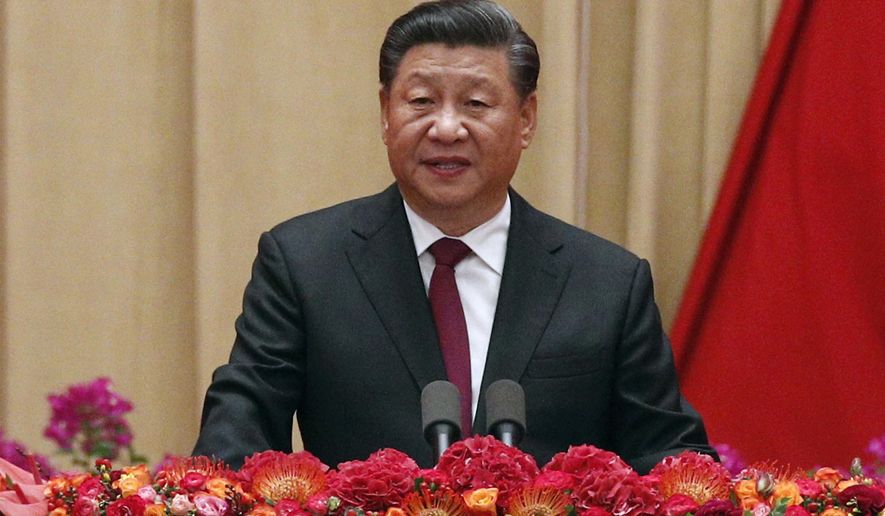OPINION:
Rather than becoming the “responsible stakeholder” that U.S. Deputy Secretary of State Robert Zoellick forecast in 2005, President Xi Jinping has chosen instead to unsheathe China’s aggressive military, economic and political policies to confront the United States and its allies.
Espionage has been a critically important tool for Mr. Xi in his drive to implement China’s bellicose domestic and foreign policies.
In “Chinese Communist Espionage: An Intelligence Primer,” published just last month, authors Peter Mattis and Matt Brazil lift the veil on how Mr. Xi and his predecessors have ruthlessly used China’s intelligence services to project power abroad and exercise Orwellian “Big Brother” control over the population at home.
The primer is particularly timely in light of a number of revelations reflecting the growing throw-weight and aggressiveness of Chinese espionage. Last month, former CIA Officer Jerry Lee was sentenced to 19 years in prison. Prosecutors said Lee conspired to deliver sensitive national defense information to China.
Also last month, Chinese intelligence officer and alleged defector Wang “William” Liqiang requested political asylum in Australia. Mr. Wang provided detailed information on what he said were Chinese covert efforts to influence politics in Australia, Hong Kong and Taiwan.
The general contours of the Sino-American conflict have been clear for some time. Militarizing the South China Sea, Beijing has infringed on the economic rights and sovereignty of its neighbors in the region. In 2015, China allegedly hacked into the Office of Personnel Management (OPM) to steal U.S. government employee data. China steals U.S. intellectual property and trade secrets through espionage and by requiring American and Western companies to share technology secrets in return for market access.
FBI Director Christopher A. Wray told Congress last year that, “from a counterintelligence perspective, China represents the broadest and most challenging threat we face as a country.”
Mr. Mattis and Mr. Brazil deliver a detailed history and current assessment of Chinese espionage activities. Their encyclopedic review of key Chinese intelligence officers and their spying operations dating back to the 1949 Communist takeover highlights how the United States and other major trading partners are under siege from a pernicious, multifaceted attack on government, commercial and academic targets.
China engages in cyberspying, signals intelligence (SIGINT) and human operatives (HUMINT). Mr. Mattis and Mr. Brazil lay out the case that Chinese intelligence organs deploy selected students to target U.S. academic institutions; business executives to infiltrate the U.S. high technology sector; and traditional intelligence officers to penetrate intelligence agencies, including the CIA and Defense Intelligence Agency.
China has focused on acquiring cutting-edge technology, both overtly and clandestinely. Mr. Brazil and Mr. Mattis provide an exhaustive list of illegal shipments of technology to China, including from major U.S. companies and research laboratories. China successfully targeted the Federal Reserve Bank of New York.
China’s Ministries of Public Security and State Security trace their origins to the creation of the Red Army in the 1920, an army which relied on clandestine operations and assassination squads. From Mao Zedong’s very first days in power, China has used its intelligence services to attack its foreign and domestic enemies.
Famed Chinese military strategist Sun Tzu once said, “It is only the enlightened ruler and the wise general who will use the highest intelligence of the army for purposes of spying and thereby they achieve great results.”
The U.S. intelligence community faces a major assignment in countering China’s espionage. Conducting espionage operations of our own against China is essential to gaining a better understanding of Mr. Xi’s long-term plans, including his strategy for crushing democracy activists in Hong Kong and attacking Taiwan’s independence.
Effectively contesting, containing and influencing China’s rise is the best ways to head off a military conflict between the U.S. and China, while protecting U.S. national security interests. But as Mr. Brazil and Mr. Mattis demonstrate, there is no end in sight to the shadowy intelligence struggle, where we must continue to counter and defend ourselves from Beijing’s pernicious efforts.
• Daniel N. Hoffman is a retired clandestine services officer and former chief of station with the Central Intelligence Agency. His combined 30 years of government service included high-level overseas and domestic positions at the CIA. He has been a Fox News contributor since May 2018. Follow him on Twitter @DanielHoffmanDC.




Please read our comment policy before commenting.